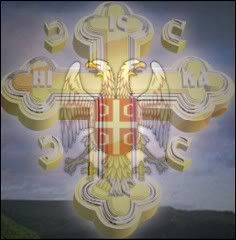Post by Emperor AAdmin on Jan 24, 2011 14:24:32 GMT -5
Serbs have been primarily refereed to as Triballians, Rascians, Dalmatians, Illyrians, Vlachs, Slavonians (Sclavinians) and Servians.
1st five names are not derived from Slavs.
IDEA: I am stating that it might be reasonable to postulate that the last name, Servians, could also be derived from non-Slavic origin. Byzantines were the ones who came up with the name in their records. The name often (if not always) appears to has been written as Servia versus any other derivative of this name early on. It might sound logical to postulate that Byzantines would call this population SERVians. Reason for that is that they were indeed SERVants of the Orthodox God imported from Byzantines.
Servia
www.newadvent.org/cathen/13732a.htm
--------
Vast majority of the names used for Serbs in medieval period appear not to be derived from Slavic (and certainly not from Sarmatian) source.
------
Rascians
One of the names for Serbs are Rascians (derived from 'Ras' which is further derived from preslavic name of the Byzantine fort in the same location called 'Arsa'). Non slavic in origin.
[11]# ^ Procopius, De aedificiis, IV 4
en.wikipedia.org/wiki/Names_of_Serbia#Rascia
------
Triballians
Triballians were a Thracian tribe and name most frequently used for Serbs. This in my view can be the only logical alternative to name of Servian and could easily be the original name for Serbs in itself. Srbalj being one of the variants of Srbin (that Serbs call themself). Tribal and Srbalj show clear similarities to just be coincidence (especially considering they are names for the same exact people).
en.wikipedia.org/wiki/Names_of_Serbia#Triballians
----
en.wikipedia.org/wiki/History_of_Medieval_Serbia#Origins_and_migration
Σέρβλοι (Servloi/Serbloi) is what has been recorded also by De Administrando Imperio ( books.google.com/books?id=3al15wpFWiMC&pg=PA152&lpg=PA152&dq=%CE%A3%CE%AD%CF%81%CE%B2%CE%BB%CE%BF%CE%B9&source=bl&ots=7ud3oCHXaz&sig=hQ9W-TTAcswe1PbpdVe6LIxRSSU&hl=en&ei=Uc09Ta7ZCJHogQfU5bW7CA&sa=X&oi=book_result&ct=result&resnum=1&ved=0CBMQ6AEwAA#v=onepage&q=%CE%A3%CE%AD%CF%81%CE%B2%CE%BB%CE%BF%CE%B9&f=false and we have covered related subject in our forum before illyria.proboards.com/index.cgi?board=hellasgreece&action=display&thread=31999&page=1 ). Compare the name to the most frequent name used for Serbs which is Triballians and it becomes clear that it is Triballians name that is origin of modern Serb name and not anything else.
Σέρβλοι/Servloi/Serbloi versus Τριβαλλοί/Trivali/Tribali. It is apperent that it is written in the same sequence in both Greek and Latin (seRVLoI/seRBLoI versus tRiVaLI/tRiBaLI) and not to mention of similarities between Tribal and Srbalj.
Etimology of the word Triball covered bellow
-Triballi/Τριβαλλοί (Triv(b)i/Τριβή=Trained+V(b)oli/Βολει=Throwing)(tribe/p40)
(*=source is Antonije Skokljev - "Bogovi Olimpa Iz Srbije" or "Olymbic gods are from Serbia" by A.S.)
www.scribd.com/doc/44020703/Antonije-Skokljev-Bogovi-Olimpa-Iz-Srbije
---------
Dalmatians
Dalmatians was another name for Serbs utilized by especially Byzantines (which appear to use mainly this name for Serbs).
Name clearly predates coming of Slavs.
en.wikipedia.org/wiki/Names_of_Serbia#Dalmatians.2FDalmats
----------
Illyrians
en.wikipedia.org/wiki/Names_of_Serbia#Other
-------
Vlachs
It is clear that Vlachs are romanized Balkan natives (Thracians, Illyrians) and that Serbs are by anthropology and genetics Balkan natives as well. Natives greatly outnumbered new coming Slavs that it is safe to assume that it would have taken centuries to fully Slavonize Romanized natives (who later resurface under the name of Vlachs).
en.wikipedia.org/wiki/Names_of_Serbia#Vlachs
------
CONCLUSION: NAME SERB IS DERIVED FROM TRIBALLI AND IS FULLY NON-SLAVIC IN ORIGIN. COMPARE SRBALJ ( Σέρβλοι (Servloi/Serbloi) is what has been recorded also by De Administrando Imperio which sounds like Srblji and one being called Srbalj) WITH TRIBAL. Similarities with Surbi (ancestors of Sorbs) or Sarmatian Serboi are therefore coincidental.
1st five names are not derived from Slavs.
IDEA: I am stating that it might be reasonable to postulate that the last name, Servians, could also be derived from non-Slavic origin. Byzantines were the ones who came up with the name in their records. The name often (if not always) appears to has been written as Servia versus any other derivative of this name early on. It might sound logical to postulate that Byzantines would call this population SERVians. Reason for that is that they were indeed SERVants of the Orthodox God imported from Byzantines.
Servia
www.newadvent.org/cathen/13732a.htm
--------
Vast majority of the names used for Serbs in medieval period appear not to be derived from Slavic (and certainly not from Sarmatian) source.
------
Rascians
One of the names for Serbs are Rascians (derived from 'Ras' which is further derived from preslavic name of the Byzantine fort in the same location called 'Arsa'). Non slavic in origin.
""The name Rascia (Serbian: Рашка; Raška) is used by modern historiography to refer to the mainland region (known in Serbian as the hinterlands, in contrast to the maritime fiefs of the Adriatic coast) of the Principality of Serbia inhabited and ruled by Serbs; the seat of the early medieval state of Serbia. It is used to describe Serbia up to Stefan Nemanja (1166–1196) or the forming of the Kingdom of Serbia in 1217. "Rascia" continued to serve as an exonym for Serbia in West European sources since late 12th century, along with other names such as Servia and Slavonia. The name is derived from the name of the region's most important fort, Ras which first appears in the work de aedificiis of Byzantine Procopius as Arsa prior to the forming of Serbia.[11]"
[11]# ^ Procopius, De aedificiis, IV 4
en.wikipedia.org/wiki/Names_of_Serbia#Rascia
------
Triballians
Triballians were a Thracian tribe and name most frequently used for Serbs. This in my view can be the only logical alternative to name of Servian and could easily be the original name for Serbs in itself. Srbalj being one of the variants of Srbin (that Serbs call themself). Tribal and Srbalj show clear similarities to just be coincidence (especially considering they are names for the same exact people).
The Triballi (Greek: Τριβαλλοί, Bulgarian, Serbian: Трибали/Tribali) were an ancient Thracian tribe whose dominion was around the plains of southern modern Serbia[12][13] and west Bulgaria, at the Angrus and Brongus (the South and West Morava) and the Iskur River, roughly centered where Serbia and Bulgaria are joined.[13]. This Thracian tribe has etymologically been connected with the Serbs,[14][15] as many medieval Byzantine historians referred to the Serbs as the Triballians[16] (Serbian name for Triballians is "Srblji/Србљи", Thracians is rašani - the first Serbian state was Rascia, present-day Serbia). Trebinje, a present city of Herzegovina and historical Serbian principality (Travunija, sometimes rendered as Triballia) has also been connected with this tribe. From the 11th century until the fall of the Byzantine Empire, the Serbs were called Triballians in Byzantine works.[17][18][19][20][21] For example in the works of historian Niketas Choniates (1155–1215), Emperor Manuel II Palaiologos (1391–1425), it is explained that Triballians are synonymous with Serbs.
12# ^ Papazoglu 1978, 58-61
13# ^ a b George Grote: History of Greece: I. Legendary Greece. II. Grecian history to the reign of Peisistratus at Athens, Vol 12, 1856 "...from the plain of Kossovo in modern Servia northward towards the Danube..."
14# ^ The letters of Manuel II Palaeologus
15# ^ www.eliznik.org.uk/Bulgaria/history/thracian-tribes.htm
16# ^ The development of the Komnenian army: 1081-1180
17# ^ JSTOR: The English Historical Review, Vol. 53, No. 209 (Jan., 1938), pp. 129-131
18# ^ Mehmed II the Conqueror and the fall of the Franco-Byzantine Levant to the Ottoman Turks Page 65, 77: "Triballians = Serbs"
19# ^ The letters of Manuel II Palaeologus Page 48: "The Triballians are the Serbs"
20# ^ The Journal of Hellenic studies Page 48: "Byzantine historians [...] calling [...] Serbs Triballians"
21# ^ Studies in late Byzantine history and prosopography Page 228: "Serbs (were) Triballians"
en.wikipedia.org/wiki/Names_of_Serbia#Triballians
----
Medieval Greek and Latin historiographers call the Serbians "Triballi". This does not necessarily indicate a relation of Serbians with the ancient tribe with the same name. Laonikos Chalkokondyles (1430-1490) says that at his time the Triballian land is around the area where river Morava meets Istrus (Danube) river ("... per regionem Triballorum. Ea autem region est, quam alluit Morabas fluvius, et in Istrum effunditur.")[20].
20# ^ Chalcocondylus Laonicus (Chalcondyles) Historiarum de origine ac Rebus gestis Turcorum, book 7, pp. 349 (Greek text), 351 (Latin text). Available on line as pdf file www.veritatis-societas.org/103_Migne_gm/1430-1490,_Laonicus_Chalcocondylus,_De_Rebus_Turcis_(MPG_159_0007_0556),_GM.pdf .
en.wikipedia.org/wiki/History_of_Medieval_Serbia#Origins_and_migration
Σέρβλοι (Servloi/Serbloi) is what has been recorded also by De Administrando Imperio ( books.google.com/books?id=3al15wpFWiMC&pg=PA152&lpg=PA152&dq=%CE%A3%CE%AD%CF%81%CE%B2%CE%BB%CE%BF%CE%B9&source=bl&ots=7ud3oCHXaz&sig=hQ9W-TTAcswe1PbpdVe6LIxRSSU&hl=en&ei=Uc09Ta7ZCJHogQfU5bW7CA&sa=X&oi=book_result&ct=result&resnum=1&ved=0CBMQ6AEwAA#v=onepage&q=%CE%A3%CE%AD%CF%81%CE%B2%CE%BB%CE%BF%CE%B9&f=false and we have covered related subject in our forum before illyria.proboards.com/index.cgi?board=hellasgreece&action=display&thread=31999&page=1 ). Compare the name to the most frequent name used for Serbs which is Triballians and it becomes clear that it is Triballians name that is origin of modern Serb name and not anything else.
Σέρβλοι/Servloi/Serbloi versus Τριβαλλοί/Trivali/Tribali. It is apperent that it is written in the same sequence in both Greek and Latin (seRVLoI/seRBLoI versus tRiVaLI/tRiBaLI) and not to mention of similarities between Tribal and Srbalj.
Etimology of the word Triball covered bellow
-Triballi/Τριβαλλοί (Triv(b)i/Τριβή=Trained+V(b)oli/Βολει=Throwing)(tribe/p40)
(*=source is Antonije Skokljev - "Bogovi Olimpa Iz Srbije" or "Olymbic gods are from Serbia" by A.S.)
www.scribd.com/doc/44020703/Antonije-Skokljev-Bogovi-Olimpa-Iz-Srbije
---------
Dalmatians
Dalmatians was another name for Serbs utilized by especially Byzantines (which appear to use mainly this name for Serbs).
Name clearly predates coming of Slavs.
Dalmatians/Dalmats
In the context of referring to the local peoples writers describing contemporary events of their time using archaic names, the Byzantine writers most often called the Serbs "Dalmats". This starts with John Kinnamos, when he had wrote in the 12th century in his work "the Serbs, a Dalmatic tribe" (Σέρβιοι, ε-8-νος Δαλματικών), henceforth writing simply "Dalmats" or "Dalmatic people" in the contexts of the Serbs and "Dalmatia" in the context of Serbia. The same practice is continued by Anna Comnena in her "Alexiad" a chronicle of events in the late 11th century.[22] There are numerous other, less prominent, instances, poetic for example - Theodore Prodromus, Michael Italicus and the typikon of the Pantokrator monastery, among others.
In a very similar manner, the Moesians and occasionally, Peonians, was the term for the Bulgarians.
22^ Anne Comnene, Alexiade (Regne de L'Empereur Alexis I Comnene 1081-1118) II, pp. l57:3-l6; 1.66: 25-169. Texte etabli er traduit par B. Leib t. I-III (Paris, 1937-1945).
en.wikipedia.org/wiki/Names_of_Serbia#Dalmatians.2FDalmats
----------
Illyrians
* Illyrians, in the Austrian Empire, example of it being Rescriptum Declaratorium Illyricae Nationis from 1779, declared by Maria Theresa, which officially established the position of Serbs and Serbian Orthodox Church in the Empire.[citation needed]
en.wikipedia.org/wiki/Names_of_Serbia#Other
-------
Vlachs
It is clear that Vlachs are romanized Balkan natives (Thracians, Illyrians) and that Serbs are by anthropology and genetics Balkan natives as well. Natives greatly outnumbered new coming Slavs that it is safe to assume that it would have taken centuries to fully Slavonize Romanized natives (who later resurface under the name of Vlachs).
Vlachs
Vlachs, referring to pastoralists, was a common name for Serbs in the Ottoman Empire and later.[5]
Tihomir Đorđević points to the already mentioned fact that the name 'Vlach' didn't only refer to genuine Vlachs, but also to cattle breeders in general.[5] A letter of Emperor Ferdinand, sent on November 6, 1538, to Croatian ban Petar Keglević, in which he wrote "Captains and dukes of the Rasians, or the Serbs, or the Vlachs, who usually call themselves the Serbs".[5] Serbs that took refuge in the Habsburg Krajina, were called "Vlachs" by Croats.[5] In the work "About the Vlachs" from 1806, Metropolitan Stevan Stratimirović states that Roman Catholics from Croatia and Slavonia scornfully used the name 'Vlach' for "the Slovenians (Slavs) and Serbs, who are of our, Eastern confession (Orthodoxy)", and that "the Turks in Bosnia and Serbia also call every Bosnian or Serbian Christian a Vlach (T. Đorđević, 1984:110). That the name 'Vlach' used to signify the Serbs is testified by Vuk Karadžić as well, who quotes the poem sang by Turkish women: "A couple of Vlachs came passing by, with powder in their pumpkins". In "Serbian Dictionary" itself, under the word 'Vlach', the above mentioned assertion is confirmed, as well as in many other proverbs recorded by Vuk.[5]
5# ^ a b c d e f facta.junis.ni.ac.rs/pas/pas2003/pas2003-02.pdf
en.wikipedia.org/wiki/Names_of_Serbia#Vlachs
------
CONCLUSION: NAME SERB IS DERIVED FROM TRIBALLI AND IS FULLY NON-SLAVIC IN ORIGIN. COMPARE SRBALJ ( Σέρβλοι (Servloi/Serbloi) is what has been recorded also by De Administrando Imperio which sounds like Srblji and one being called Srbalj) WITH TRIBAL. Similarities with Surbi (ancestors of Sorbs) or Sarmatian Serboi are therefore coincidental.








